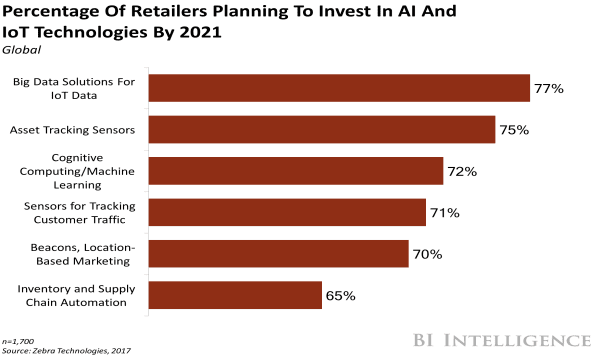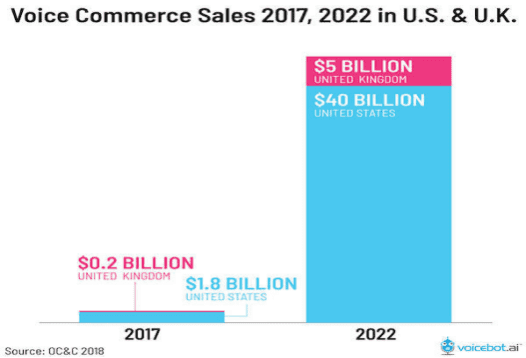Is AI a Boon for the E-commerce Market?
When it comes to the best of technology, one can’t ignore the infinite power of artificial intelligence. It has been an invention that has automated operations to an extent that has added sophistication to businesses. One such area where AI has been spreading its magic narrows down to e-commerce.
Look at this prediction that measures the growth of AI in the retailing sector.

Be it the near to reality user experience or on-the-go virtual support; AI is successfully driving the e-commerce business. According to Gartner, almost 80 percent of customer interactions will be looked after AI by the year 2020.
There is no doubt in the fact that AI will be a stimulating agent for the world of e-commerce. But, the question is as to what are some great inventions to look out for? Let’s deep dive into the futuristic prospects.
Where Pictures Speak Louder than Words
You would have noticed a search box on each of the URLs you visit. This keyword-driven space helps a website visitor to navigate their way through what they are looking for.
But, this is going to change now! The AI-enabled industry is making the search shift towards visual search. According to MarketsandMarkets, the image recognition market is likely to grow to $25.65 billion in 2019.
In layman’s terms, a user can upload an image in the search section to get an image-similar result across the webspace.
Here are some retail categories where the visual search is the most prevalent.
A notable and the most prevalent example of visual search is “Pinterest.” The Pinterest lens offers a chance to the users to upload pictures in the search space.
Assistance from Virtual Shopping Assistants
In offline shopping, you roam around a showroom with a salesperson suggesting to you your size, your fit, and your best match. With Artificial intelligence in the lead, your shopping assistant is available online too.
The AI-enabled assistant can make suggestions based on your past purchase patterns. The best part; these assistants would notify the price drops on your favorites. Isn’t that great?
Here is why most people prefer virtual shopping assistants over human executives.
Image Source
An example of a live application of AI shopping assistant that has proven to be a success is “Honey Smart Shopping Assistant.” The smart system goes on to suggest the best of online stores with the best of offers.
Feeling Smart with Artificial Neural Networks
Artificial neural networks by definition are computing systems that can perform certain tasks, even when there are no pre-set task-specific rules.
Putting it simply, artificial neural network engineering attempts to create a system that behaves similar to a human brain. The information is fed to the system and it deciphers insights all by itself.
The authenticity of the self-learning can be verified with backpropagation (feedback).
The ANN system can help in advanced searches, shopping personalization, and even sales forecasting.
Your Utterances are the New Keywords
Searches are not only limited to words and images. Voice search has its own share of a role too. All you need to do is say the right words to get the desired result.
According to a study, about 50 percent of searches would be voice-driven by 2020. Thus, for any business, it is essential to optimize their marketing strategy to fit the voice search queries of users.
Have a look at this expected voice commerce sales in 2017 and 2022, in the US and UK alone.
Image Source
The concept is already gaining attention with Amazon’s Alexa and Apple’s Siri available in the market. Talking of the e-commerce industry, the Domino’s Voice Assistant deserves a mention.
The voice search option gives a humanly touch to e-commerce platforms, which, in turn, makes it a promising AI feature.
Relishing the Power of Machine Learning
This is as vast as it gets with the end results to be surprising. Online brands have been readily adopting machine learning to enhance search results. The technology has proved to be a great tool in adding a personalized experience.
A study by Janrain, says that 73% of customers are presented with irrelevant content. So, there is no doubt why machine learning has stepped in to convert irrelevant into relevant.
Machine learning has enabled improved product recommendations, optimized search results, better customer support, and quicker solutions.
A real-life application of machine learning in the e-commerce industry is “Edgecase.” The brand deploys machine learning technology as an aid to e-commerce retailers for better user engagement.
The Takeaway
This is it! AI is certainly the best thing to happen to the e-commerce sector. With infinite possibilities introduced by artificial intelligence, one can expect escalated sales and fabulous user experience.
With a lot discovered, there is still a lot to be discovered! The only need for businesses is to dive into the realm of technology and take risks.
What should follow is the flexibility to adapt to the change and go with the flow! After all, AI is the present and the future that surpasses the human tendency to make a business prosper.












